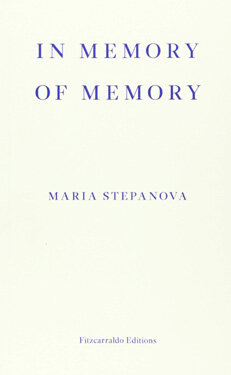At some point in life we all wonder about our family history. Who were these ancestors whose coupling through succeeding generations has unwittingly resulted in us? What do any surviving photographs, stories and momentos say about them and can we ever obtain a meaningful understanding of these lives from the past? Maria Stepanova has been trying to construct an account of her family history for a long time and become its narrator like a documentary filmmaker: “I would become a stranger, a teller of tales, a selector and a sifter, the one who decides what part of the huge volume of the unsaid must fit in the spotlight's circle, and what part will remain outside it in the darkness.” When her Aunt Galya dies she sifts through the belongings Galya left and discovers that “The meek contents of her apartment, feeling themselves to be redundant, immediately began to lose their human qualities and, in doing so, ceased to remember or to mean anything.”
Thus, Stepanova presents us with memories, anecdotes, letters, diary entries and other documents alongside her journeys to significant locations from her ancestors' lives to form a loose picture of their past. In doing so we gain access to not only her personal family history, but Russian Jewish life over the course of the 20th century. There are innumerable accounts of this period of European history, but Stepanova brings a new perspective of rigorous enquiry into how we memorialise people from the past and how their narrative has been self-consciously shaped. More than this, Stepanova rigorously questions how we interact with fragments from the past and what memory means: “This book about my family is not about my family at all, but something quite different: the way memory works, and what memory wants from me.” The result is an utterly enthralling rumination on this subject which sheds light on what the past really means to us and the responsibility tied to the act of remembering.
Some books take me longer to read than others and this was one I really needed to be patient with – not only because it's 500 pages long but because the text contains such a density of ideas I often stopped to copy passages out, look up references or documents such as the short film 'Diversions' by Helga Landauer and ruminate upon the many dilemmas the author presents. She gives so much to consider when contemplating the meaning of memory and includes numerous scholarly, literary and artistic references through which to probe how we relate to the past. At some times it does feels too cluttered and that it could have been usefully cut down to streamline the points she's making. Of course, part of the point is: how do you begin to form a story about the past with the enormous amount of material which survives, especially when so many of these things don't really mean anything anymore? She elegantly summarises how “Pointless knowledge expands at an unstoppable rate: not like a building, which grows with the slow addition of floors, more like that terrifying wartime spring thaw when the bodies were slowly exposed by the melting snow.” But it feels like there's a lot to wade through before getting to Part 3 which beautifully summarizes her own unique mission to memorialise the story of her family. Though she concedes at the beginning of the book “I need to make it very clear at this point that our family was quite ordinary” I grew to feel real affection for them through some of the fragments Stepanova includes and her own reflections on deceased family members. There is so much which remains unknowable about these array of individuals including her young male relative who died in combat as part of the “ill-fated Sinyavinsky Operation” of 1942 or a female ancestor who studied to be a doctor in Paris. However, it's not answers about their lives but the abiding mystery which is what's important.
This book does something truly revolutionary. Rather than present dry historical documents which we inflict our imaginations upon to imbue them with meaning, Stepanova demands we grant a dignified independence to people who can no longer speak for themselves and not shape them into a desired narrative. At first this message felt too unsentimental and accusatory to me, but as I continued reading I came to more dynamically understand the moral implications of fixing people from the past within a certain story. How much of our family histories is true and how much embroidered with fiction? And how do we deal with the feeling that to recite the facts is dull but to fabricate is to deviate from history? It's given me such a new perspective on memory and family history which will continue to impact how I think about the past. At times, Stepanova risks sounding curmudgeonly in her point of view when she forcefully dismisses the prevalence of selfies or damns pornography as the lowliest form of documentation. I'd certainly not make a case for the lasting importance of either of these things, but she doesn't fully consider their broader meaning. While I didn't always agree with a number of the author's points, I've learned so much from this book and it's expanded my perspective on the enormous subject of memory. It's also encouraged me to take a more active engagement in my own family history and speak with my parents about where we come from.








